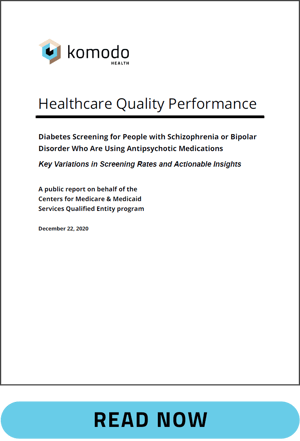New Komodo Health Analysis Finds Significant Variation in Diabetes Screening Among People with Schizophrenia and Bipolar Disorder

 Komodo Health's First QE Report for CMS Finds Commercially Insured Patients Less Likely to Receive Essential Screening
Komodo Health's First QE Report for CMS Finds Commercially Insured Patients Less Likely to Receive Essential Screening
Numerous studies have shown that people with schizophrenia or bipolar disorder have a higher risk for developing type 2 diabetes mellitus (T2DM) compared to the general population. The phenomenon is driven by a combination of factors that include use of medications that can disrupt normal serum glucose control, increased likelihood of unhealthy lifestyles and reduced access to consistent and effective preventative health services.
Accordingly, routine screening for T2DM and other cardiovascular issues has become an essential foundation for identifying and managing this risk. However, according to a new analysis conducted by Komodo Health, many patients who are prescribed these medications do not receive annual screening for diabetes and other metabolic disorders. Moreover, the report finds that screening rates vary systematically by geographical region of the country and by the type of health insurance or health care benefit plan in which a patient is enrolled (e.g., public vs. private healthcare benefit, indemnity versus managed care).
The performance measurement analysis was conducted using Komodo’s Healthcare Map™ and the CMS Medicare fee-for-service data set under the Centers for Medicare & Medicaid Services Qualified Entity Program (QECP). This report is part of a larger set of initiatives to measure and quantify the extent to which patients with chronic and debilitating conditions are receiving evidence-based diagnostic and therapeutic interventions and whether they also are being monitored for specific side effects or risks relating to the use of certain medication therapies. To conduct the analysis, Komodo used a Healthcare Effectiveness Data and Information Set (HEDIS®) standard measure that was developed by experts and is endorsed by the National Quality Forum, and is initially reporting on measurement year 2017.
Following were some of the key findings:- 72% of Patients Receive Necessary Screening: Overall, approximately 72% of patients with schizophrenia or bipolar disorder who were prescribed atypical antipsychotics were screened for diabetes sometime during the measurement year.
- Commercially Insured Patients Significantly Less Likely to Receive Screening: Screening rates varied significantly depending on the type of insurance coverage that a patient had. The highest rate of screening (79.3%) was seen in the group of patients in the Medicaid-Medicare Dual category. The lowest rate of screening (51.6%) was seen in the group of patients in the Commercial-Private category.
- Patients in Alaska and Rhode Island Least Likely to Receive Screening: Screening rates also varied significantly depending on a patient’s state or territory of residence. The report found a 26.5% difference between the state with the highest screening rate (Illinois) and the state with the lowest screening rate (Alaska). Other states and territories with particularly low screening rates were Rhode Island (59.1%), Puerto Rico (61.1%) and Alabama (62.0%).
Several factors may be influencing these trends. Among them, the report cites recent changes to Medicaid managed care contracts and reimbursement incentives for coordination of care in Medicaid-Medicare Dual and Medicaid Managed Care patients and geographical variations in practice patterns that are likely playing a significant role.
To view the full report, click here.




